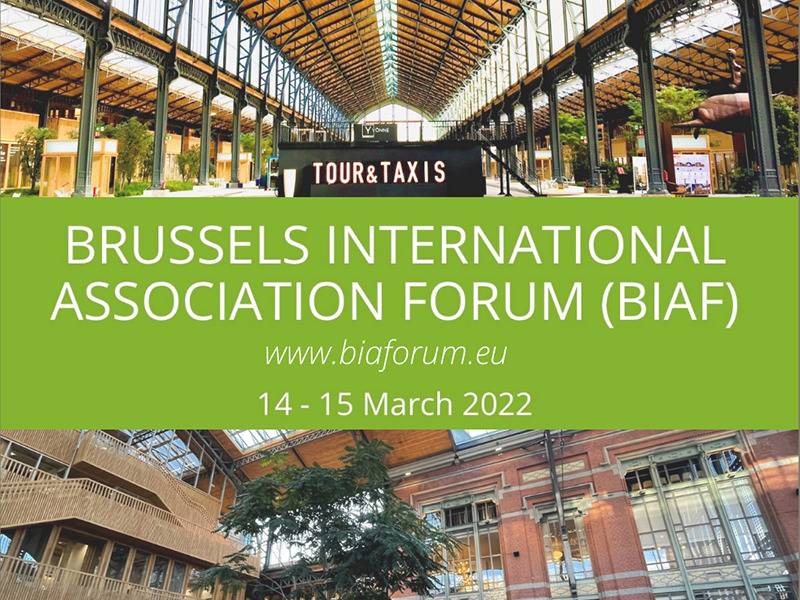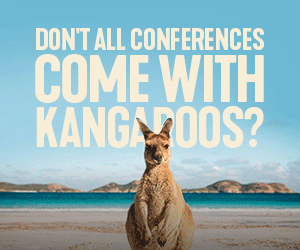BIAF 2022: Moving from Membership Communication to Community Engagement

Brussels is preparing to host yet another association forum on 14 and 15 March, bringing together various representatives of international and European associations, as well as non-profit organisations, federations, societies and NGOs. The Brussels International Association Forum (BIAF) aims to create a knowledge-sharing event and establish a meeting platform in one of the city's venues of excellence: Tour & Taxis.
Building on the recent success of the Geneva International Association Forum (GIAF), the organising body, ASSOCIATIONWORLD, has considered the possible expansion of its collaborative network, launching the discussion with its various partners − such as Visit Brussels’ European Association Summit (EAS) − about the synergies that a new association forum in Brussels could create. BIAF is a different type of event to EAS and aligns with the concept of the GIAF event and its experiential learning in one of the world-class cities for international associations.
The programme combines keynote speakers, a masterclass, peer-to-peer exchange and workshops, panel discussions and outdoor activities related to innovation, well-being and healthy minds. Especially considering the critical moment that many associations are going through after the wear and tear of these two difficult years. On that note, 92% of expected participants transferred their tickets to the March date when the event, originally planned for December 2021, was postponed due to the pandemic.
 We asked the event's founder, Kai Troll (pictured right), to dig deeper into BIAF down here:
We asked the event's founder, Kai Troll (pictured right), to dig deeper into BIAF down here:
1) When you set out on this idea of creating a new associative forum, what geographical targets and what prototype association did you have in mind?
Although we have 70% European associations and 30% international associations based in Brussels - which is the opposite of Geneva, for example - we will address not only the EU bubble class of associations, but also international associations, non-profit organisations, institutions and academic partners in order to discuss themes and topics that are universal, relevant and with tangible learning outcomes. Our future goal is that besides the local presence of international and European associations based in Geneva or Brussels, we could see approximately 20% of associations coming from abroad. We also started to see more exchange between our GIAF and BIAF participants, even before the latter was launched. Realistically, due to the restrictions and measures in place around the world, we will see mostly representatives of associations from Benelux and neighbouring countries attending the first edition of BIAF on 14 and 15 March. The understanding of our participants towards the postponement of the event was great news and indicates that our industry is ready for face to face peer exchange. We will go above and beyond to keep everyone safe.
2) What kind of programme are you preparing to address the most critical problems and hurdles within the international association?
There is clearly much more member communication going on than before the pandemic. I believe that in 2022, associations are moving towards more quality engagement rather than keeping or even boosting the level of online and virtual exchange. The key question now is how you move from membership communication to community engagement. This is also a topic that we will address at BIAF. We asked our advisory committee to reach out to association peers and ask them what relevant current topics they would like to hear and discuss. The March agenda will remain similar but we will update about 20% of the programme to keep it relevant. We see discussion topics around event strategies, monetisation and pricing structure of (hybrid) events, diversification of revenue and the current status quo and planning of our events in these challenging times. We will discuss concrete new revenue streams that every association or non-profit can implement. Sustainability and innovation, advocacy, campaigning and media workshops are on the agenda to share the great works that associations are conducting. The topic of well-being cannot be missed in any agenda these days and we have inspiring corporate and professional speakers talking about impactful leadership and brand building.
Last but not least, BIAF is also the next best possibility to meet associations peers and friends that haven’t seen each other for too long and to discuss informally. Often, these are the best conversations.
3) What is the legacy and story you wish to tell with this BIAF debut?
The legacy of an event does not start the day the event ends, but rather when it starts to be planned. Therefore, the choice to partner with Tour & Taxis was almost inevitable. The sustainable development goals are widely discussed within associations, and they very much help tackle one or several of the UN SDGs. Sustainability and legacy building is, for many, a big part of the core business and the reason for their existence. If that is the case, then we also have to walk the talk and that thinking must extend to the organisation of our events as well. One of the legacies of BIAF should be that associations gain a better understanding and assessment for themselves of what "legacy" actually means for them. How can each of them better define the internal and external components of legacy and how can they be measured? Legacy planning should be part of every strategic planning process. It brings several stakeholders to the discussion. If you don’t plan legacy, it won’t happen. Another BIAF legacy will be the launch a new annual campaign by ASSOCIATIONWORLD, the European Association Week, which will that will take place in the last week of each May starting in 2022.
Other Articles
About Us
Supported by the Union of International Associations (UIA), the International Association of Professional Congress Organisers (IAPCO) and the Interel Group, the global public affairs and association management consultancy, Headquarters Magazines serve the needs of international associations organising worldwide congresses.















